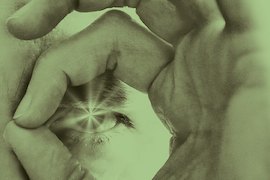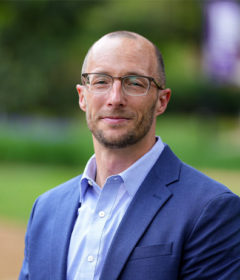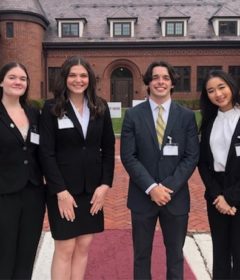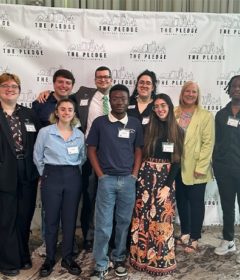Insights into Meaning

by Ronald W. Williamson
Seek the meaning of life? Seriously? The meaning of life?
Forget about it. No one knows the meaning of life.
But seek meanings in one’s own life? That’s an entirely different matter. It’s a highly regarded human quest, often pushed to cope with our mortality and, pretty much, it’s one of life’s requirements.
That’s a common perspective posed by learned scholars in informal conversations, sidewalk chats and classroom lectures in Stetson University’s schools, colleges, institutes, programs and centers. The search for personal meaning may be nothing more than a coping mechanism for death, but scholars encourage it as a key to a full life.
The search, most say, is fundamentally human. Probably. Maybe. Mostly. Depends on who’s talking.
“I think it is a core part of being human. All of history demonstrates that we search for meaning,” says professor of decision and information science John Tichenor, Ph.D.
We seek in order to make life worth living, says a law professor. We seek because the ego demands it, adds a business professor. Because we are curious and highly motivated creatures, stresses a psychology professor.
To find purpose, to make a difference, to seek connections, because we’re obsessed with life and death, because existence as a person incorporates this unavoidable quest — and many other observations, beliefs and contemplations.
Meaning is among the most personal canons of our lives. Humans have sought life’s meanings since stories were born in cave firelight and shadows against standing stones. Countless answers have been found by eons of cultures and not one answer is universally satisfying to our species.
Not one. Humankind doesn’t seem to know the meaning of life if there is one.
But meaning in one’s own life, however, is vital, Stetson professors say. It’s so vital, it may be irresistible, certainly elemental. Humans have sought personal meaning in so many ways for so many thousands of years that by now it seems an innate characteristic, and death may be the prime cause.
“Unlike other creatures, we know we will die,” explains associate professor of psychol-ogy Chris Ferguson, Ph.D., “a knowledge that leads us to seek meaning. We wish to believe that our life has some meaning beyond merely being part of a reductive biological system.”
“The meaning of our human existence starts with the realization that we are going to die,” agrees professor of religious studies Dixon Sutherland, Ph.D.
“I believe many of us seek meaning in response to the ‘reality principle’ — the reality that we will die,” concurs Law Professor Michael S. Finch. “A meaningful life is one that helps us transcend the seeming bleakness of a short existence.”
“We find meaning as a way to deal with our own mortality,” says Hala ElAarag, Ph.D., associate professor of computer science. “It’s difficult for humans to face an end to their own existence, so they want to create something that will live beyond them.
“It’s the nature of our mind to look for connections,” ElAarag adds. “The ultimate consequence of this is finding a common connection in all the events of our lives, which is the meaning we find.”
Finding no meaning foreshadows a dreadful future. Misery and hopelessness await those who fail to find meaning, says philosophy Professor Ronald Hall, Ph.D. Meaning is vitally important to people, he says, and the definitive proof is this: “Failure to find something important results in a sense that life is meaningless, without value or that it is not worth living.”
That leads to utter despair, concurs Hall.
“A life of quiet desperation,” adds Tichenor.
“We seek meaning,” says finance Professor James Mallett, Ph.D., “because people in general cannot accept that there is no permanent self or that everything with form is impermanent. They live in a delusional state that denies scientific knowledge and that leads to unease, stress and suffering.”
Meaning born in the certainty of death is one of many common — and uncommon — streams of thought reflected by random queries this spring to more than 40 Stetson professors from various disciplines. The query was basically a single short question: “Why do we seek meaning in our lives?”
Because we can’t not seek, say several professors. “It is innate and fundamentally human,” agrees assistant professor of anthropology and sociology Rachel Core, Ph.D.
“The searching is innate — switched on somewhere in our evolutionary past,” says Ferguson.
Others believe otherwise.
“Seeking meaning is not in our genes. It’s only necessary for those of us who are lost,” counters professor of modern languages and literatures Robert Sitler, Ph.D. “The search is a symptom for generalized confusion because of lost connections with nature, with other humans, with all that we experience.”
Sitler is an expert in and inspired by wisdoms of indigenous cultures of Central America, particularly Mayan.
Life in those cultures, he says, is understood in radically different ways and based on beliefs sunk deep in thousands of years of experiential knowledge.
“Questions contemplating life’s meaning would not occur to them as it might to a Western mind,” says Sitler. “Their meaning is perpetually in place as a ‘given,’ and seeking is unnecessary unless one has lost connection to the omnipresent meaning around them.”
“I don’t think it’s innate or a necessity for everyone, but for some it is,” says professor of communication studies and integrative health sciences Tara Schuwerk, Ph.D.
No, it’s not innate, agrees law Professor Judith Scully. “It seems to me we have a choice — to seek meaning on one’s own unique path and develop spiritually or be a non-thinking drone who follows someone else’s prescription for life,” adds Scully.
Prescriptions for meaning, general and individual, are abundant on Earth, ready-made, mostly spiritual and faith-based.
A large majority of Earth’s 7 billion humans turn to existing spiritual frameworks for personal meaning. Some are ancient; some are not. Some are accepted outright; others are modified to fit individual beliefs.
“Most people need a broader framework of understanding, a worldview, within which to make sense of their everyday experiences,” says religious studies Professor Phillip Lucas, Ph.D. Frameworks can foster meaning and purpose and the conviction that one’s actions fulfill deep aspirations and purpose.
“One of the goals of my courses is to introduce students to worldviews that throughout time have provided people with a sense of meaning,” explains Lucas. “I hope to provide students with both a range of ‘meaning-making’ perspectives and also to stimulate a serious search for a personal worldview that gives their lives meaning and significance.”
One of the strongest streams flowing through these thoughts of Stetson scholars is that many paths to meaning are intertwined with other human beings.
Of the infinite array of meanings in one’s life, the greatest array may be connections to others. “We find our meaning not in isolation but in others,” says Sutherland, “and if no ‘other’ is there, we’ll create one. Human existence in total isolation is unthinkable. Without the ‘other,’ it self-destructs.”
“All life exists within communities — emotional, social, biotic, economic and political,” explains English Professor Mary Pollock, Ph.D. “We are linked to and responsible for each other as well as ourselves. Becoming conscious of the meaning of community enables us to benefit from and contribute to our communities.
“A sense of community is meaningful in itself,” she says, noting scientist E.O. Wilson’s biophilia hypothesis of a link not only among all humans, but all life forms on Earth.
“We seek meaning because we, ourselves, want to be meaningful to others,” says associate professor of music Noel Painter, Ph.D. “We want to affect people, to witness our impact on the world, and to believe that our lives make a difference to those around us.”
“We often find personal meaning because of what we believe we mean in the minds of others,” says Finch, “from family, friends, readers, fans, posterity, whoever. This form of meaning is not fully satisfying. It leads us to search for an afterlife that perpetuates our individual existence.”
So, yes.
For whatever reasons and however we manage, human beings seek their own meanings in their own changing lives and in the lives of others, and this activity is as old as those campfire stories.
We do it because we are human and because it pleases us.
“Henry David Thoreau said that he wanted to live deep and ‘suck out all the marrow of life,’” says Tichenor. “Me too! That is why I seek meaning in my life.
“I don’t want to float wherever the waters of life carry me — I want to dig the oar deep to guide where the boat is heading. I might capsize, but I might not. I might actually end up going somewhere I was supposed to be,” Tichenor adds.
“How can you really live if you do not seek meaning in your life?” Tichenor asks.
Perhaps we cannot.
Read more answers to big questions in the June 2015 issue of Stetson Magazine.



